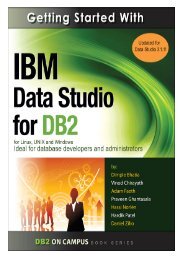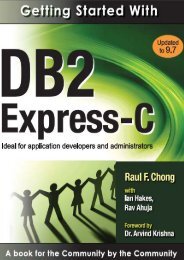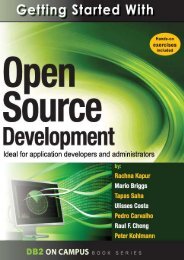Getting Started with Open Source Development
You also want an ePaper? Increase the reach of your titles
YUMPU automatically turns print PDFs into web optimized ePapers that Google loves.
52 <strong>Getting</strong> started <strong>with</strong> open source development<br />
Figure 4.1 – Community driven software development<br />
As shown in the figure, the developers' group is responsible for writing code for different<br />
independent modules of the software. The builders’ group takes these modules from the<br />
developers and put them together to build a new version of the software. These software<br />
builds are internally tested by the testers' group. In case a bug or failure is found, they<br />
report back to the appropriate developer who debugs the code and includes a proper fix.<br />
This is an iterative process that repeats itself until the product satisfies all its requirements<br />
and becomes error free to the maximum possible extent. Once the objectives of the project<br />
are met, the release management group packs together the final version (final build) of<br />
the software <strong>with</strong> all the necessary documents, and then hands it over to the customers.<br />
OSS development communities, especially those which are self driven, offer their team<br />
members the flexibility of shuffling their job roles. This means that a developer may perform<br />
the role of a tester, a tester may work as a build team member, and so on. Most<br />
importantly, these communities always keep the door open for the users (customers), so<br />
that they can also contribute effectively into the project and become part of the community.<br />
Software development tools are a collection of programs that help <strong>with</strong> specific tasks<br />
during the software development life cycle. They are normally used for project<br />
management, and to perform repetitive, and time consuming tasks. There exist both,<br />
proprietary and open source development tools. For an open source project, it should be

















